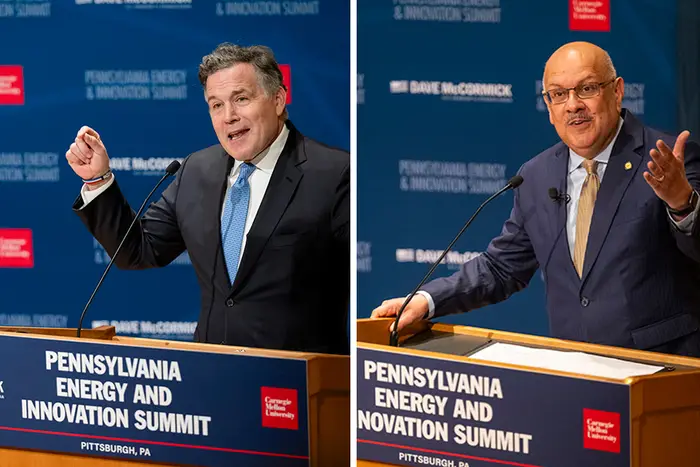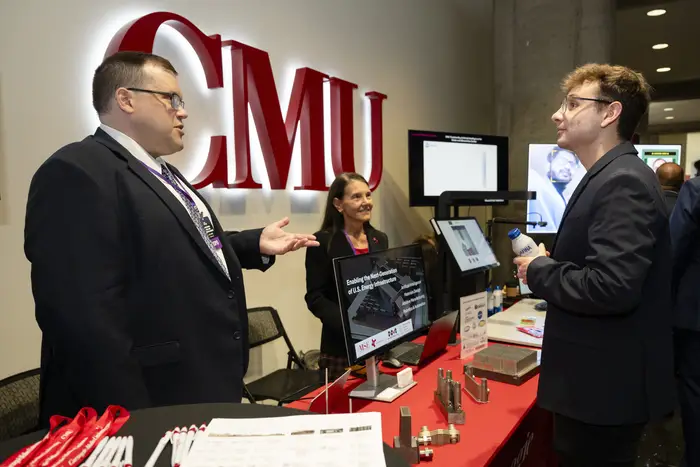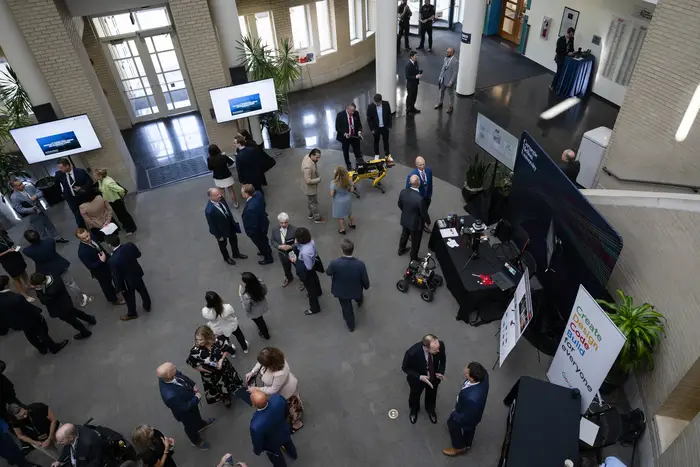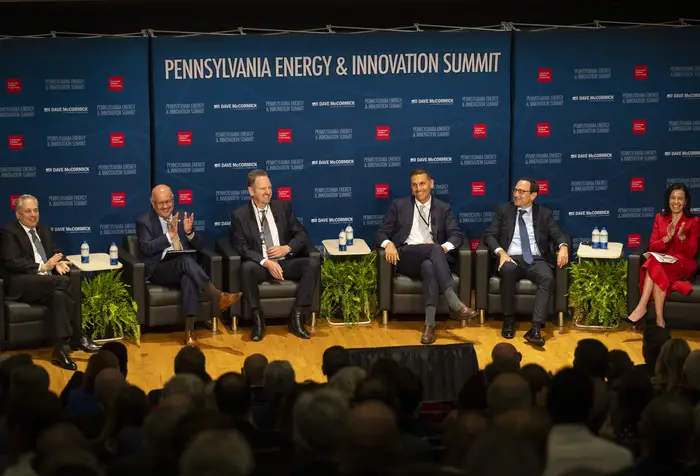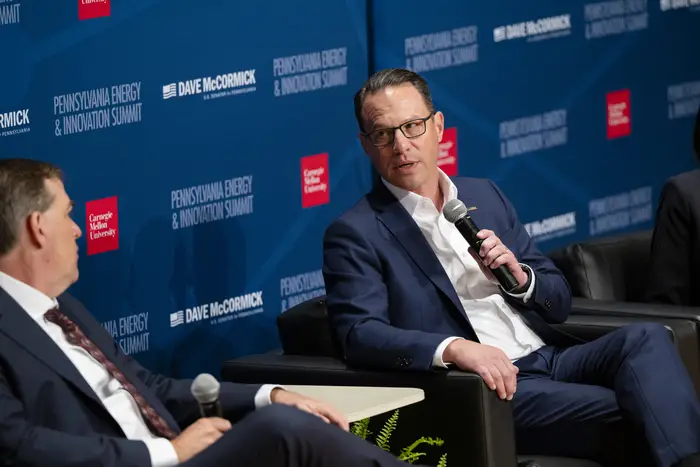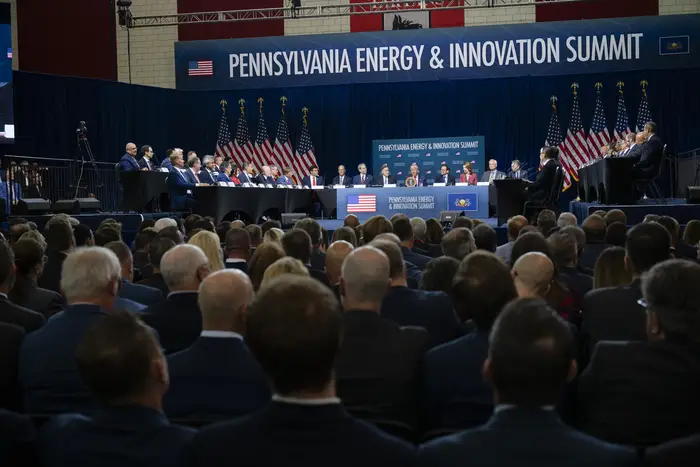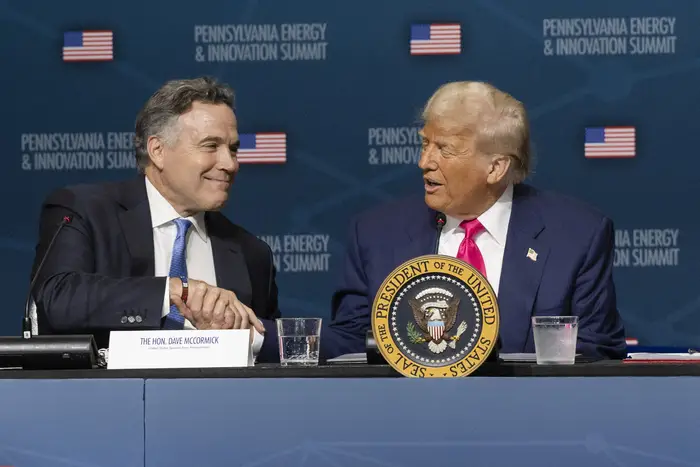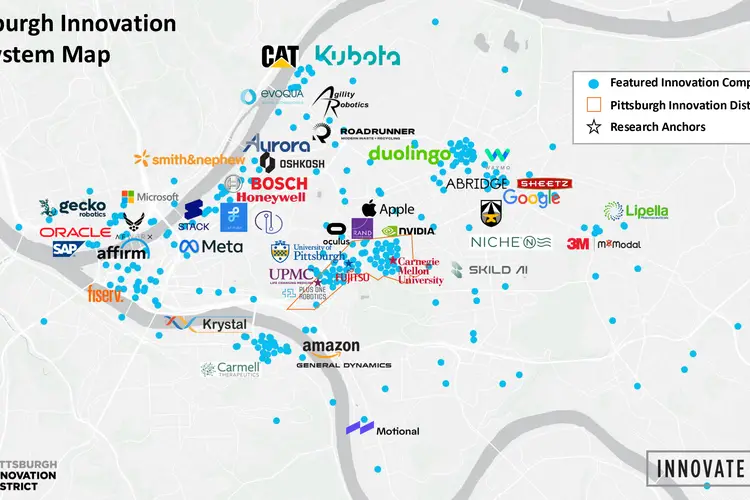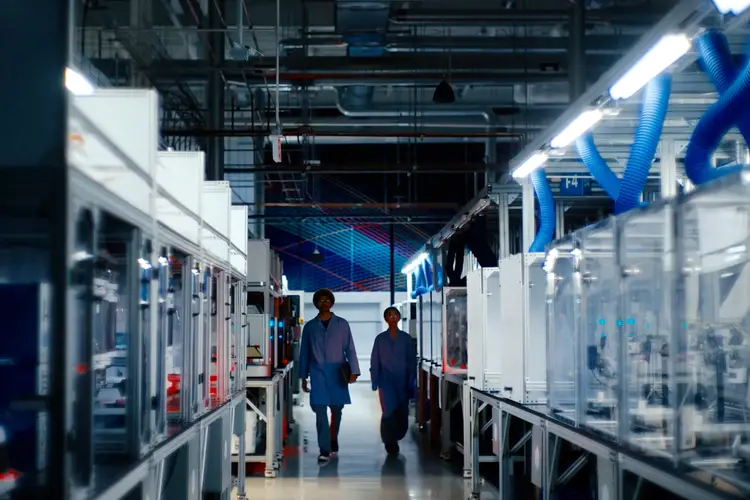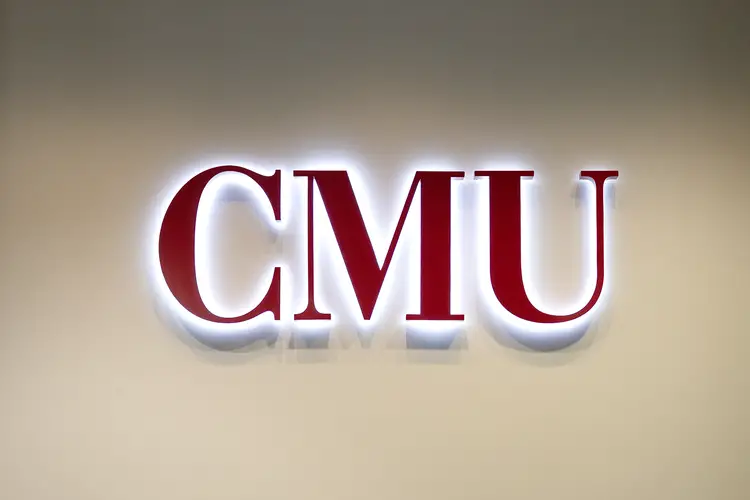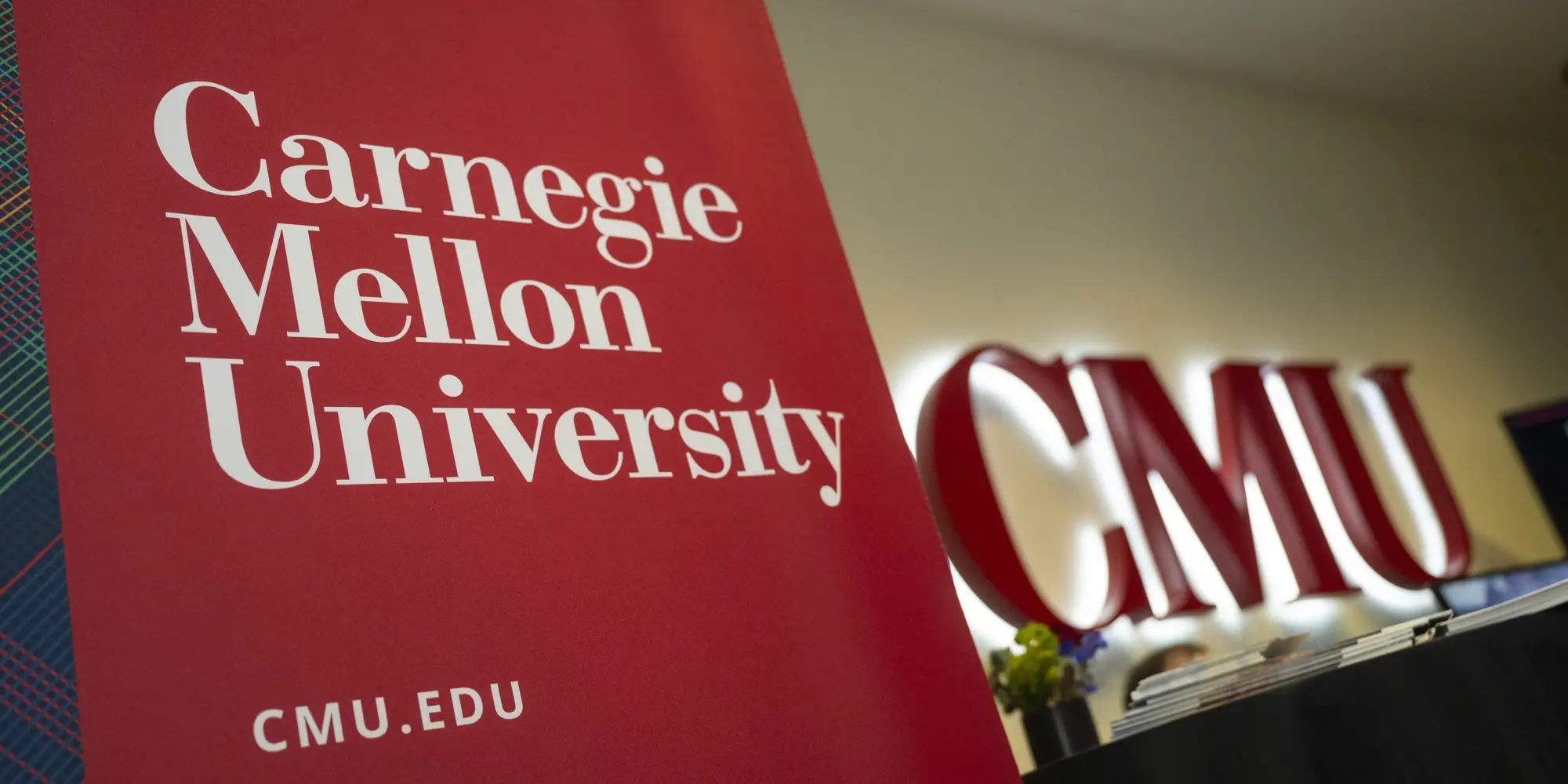
Energy and Innovation Summit Brings Government and Industry Leadership to CMU
Media Inquiries
Pennsylvania’s national competitiveness as a hub for AI and energy technology brought the nation’s top decision-makers to Carnegie Mellon University July 15 for the inaugural Energy and Innovation Summit. This gathering, convened by U.S. Sen. David McCormick and attended by U.S. President Donald Trump, saw energy sector experts, tech industry leaders and a bipartisan group of government officials from Pennsylvania including Gov. Josh Shapiro coalesce to discuss the future of energy technology.
“When we started to talk about this summit, I knew immediately we wanted to do Carnegie Mellon, a leading AI university, an incubator of great talent for our country,” McCormick said.
By hosting the summit, and through a series of faculty-authored position statements(opens in new window), Carnegie Mellon brought to bear its top-tier research and innovation on AI and energy. The 29 statements are focused on four key areas of impact: meeting AI energy demand, maximizing sustainability and protecting communities, boosting cybersecurity and defense, and accelerating innovation and discovery. They tackle some of society's toughest challenges today while pioneering new solutions for tomorrow.
“For 125 years, CMU has been at the heart of the technological revolutions that have redefined industries, remade communities, and propelled our nation forward,” CMU President Farnam Jahanian said. “We bring people together — across sectors, across disciplines, and diverse perspectives — to tackle the most pressing challenges of our time. And today is no exception.”
‘Expo’sure
The Industry and Academic Expo which underpinned the event brought academia together with corporate partners and policymakers to strengthen Pennsylvania’s rich ecosystems of industry and higher education.
From live robotics demonstrations to displays marking progress in nuclear fusion and engineering, dozens of exhibits lined the halls of Carnegie Mellon’s Cohon University Center to highlight the innovative work from across the state, including several from CMU.
Representing the university’s work in iron and steelmaking research and materials science, Bryan Webler, professor and co-director of the Center for Iron and Steelmaking Research and Sandra DeVincent Wolf, executive director of the Manufacturing Futures Institute and NextManufacturing Center, attended the event together and explained how the event presented a critical opportunity for their fields and associated industries.
"Pittsburgh's long-standing history in materials and manufacturing — specifically metals — makes this the perfect place for the expo to happen," DeVincent Wolf explained. "A lot of people don't know that 40% of all of the metal powder that is produced in the U.S. is produced within an hour of here."
The expo also served to connect faculty with the financial partners and leaders from varying levels of government who support CMU’s academic enterprise.
“There's been really big investment into the Pittsburgh ecosystem,” Webler said. “Not just from the federal government, but the state government, and even different nations that have been really committed to bringing Pittsburgh into the advanced manufacturing era.”
School of Computer Science Research Professor Jeff Schneider(opens in new window) was on hand to showcase Carnegie Mellon’s progress in the development of nuclear fusion. Much of the day’s discussions centered on the need for data centers for AI and their large power demand. Schneider explained that CMU’s ongoing research in fusion could allow for stable and sustainable energy output.
"What's exciting about Pittsburgh is, being the center of AI, we're the ones that can play a pivotal role in how we discover nuclear fusion,” he said. “I hope to get people more excited about it and get more support."
Pittsburgh’s role as an incubator for groundbreaking technology was a consistent theme, and a number of CMU-affiliated businesses and organizations — Pittsburgh-based Astrobotic, Carnegie Robotics, Skild AI and Gecko Robotics among them — participated alongside key university partners such as Google, NVIDIA, Amazon Web Services and Westinghouse.
Dialogue that delivers
The summit also featured several panel discussions that gathered leaders to explore in-depth topics related to energy and the innovation economy.
The first discussion of the day was titled “The AI Race And How To Win It,” where academic and industry leaders, including Jahanian himself, discussed the importance of talent and knowledge of the kind that Carnegie Mellon seeks to foster.
“The truth is that we cannot win the AI race without winning the race for talent,” Jahanian said during the discussion. “CMU has been in this journey behind the science of learning for more than two or three decades.”
Other panels focused on the opportunities and challenges for energy, labor, data center development and further areas of innovation in Pennsylvania, including the growing need for an equipped workforce and expertise in artificial intelligence.
The discussions featured contributions from United States Secretary of Commerce Howard Lutnick, Sen. McCormick, Gov. Shapiro, Pennsylvania Senate President Pro Tempore Kim Ward and others.
Shaping the future
Chief executives from approximately 50 companies, including household names like Google, Meta and Amazon Web Services, joined President Trump for a power-packed event to round out the day. The robust discussion featured a number of announcements from industry leaders which will help to shape the future of AI and energy.
"We're back in Pittsburgh to announce the largest package of investments in the history of the commonwealth of Pennsylvania," Trump said. "This is a really triumphant day for the people of the commonwealth, and for the United States of America."
University leaders view the summit as a springboard for ongoing efforts to showcase CMU’s pivotal role in facilitating critical conversations about the future of energy, technology, business and society in America. As home of the Wilton E. Scott Institute for Energy Innovation, Block Center for Technology and Society, and Carnegie Mellon Institute for Strategy & Technology, answering questions of global competitiveness and meaningful innovation have consistently remained a strength of the university, and a key part of its mission to foster knowledge and pursue work that matters.
"This summit offered our faculty a valuable opportunity to share their work with leaders across government and industry," said Theresa Mayer, vice president for research at Carnegie Mellon. "It was not just a chance to showcase innovation, but to help shape the national dialogue on energy, technology and competitiveness. When researchers are in conversation with decision makers, it opens the door to new partnerships and ensures that university expertise informs the strategies that move our country forward."
CMU thrives at the busy intersection of AI, innovation and energy, and our world-class researchers are tackling some of society's toughest challenges today while also pioneering new solutions for tomorrow.
